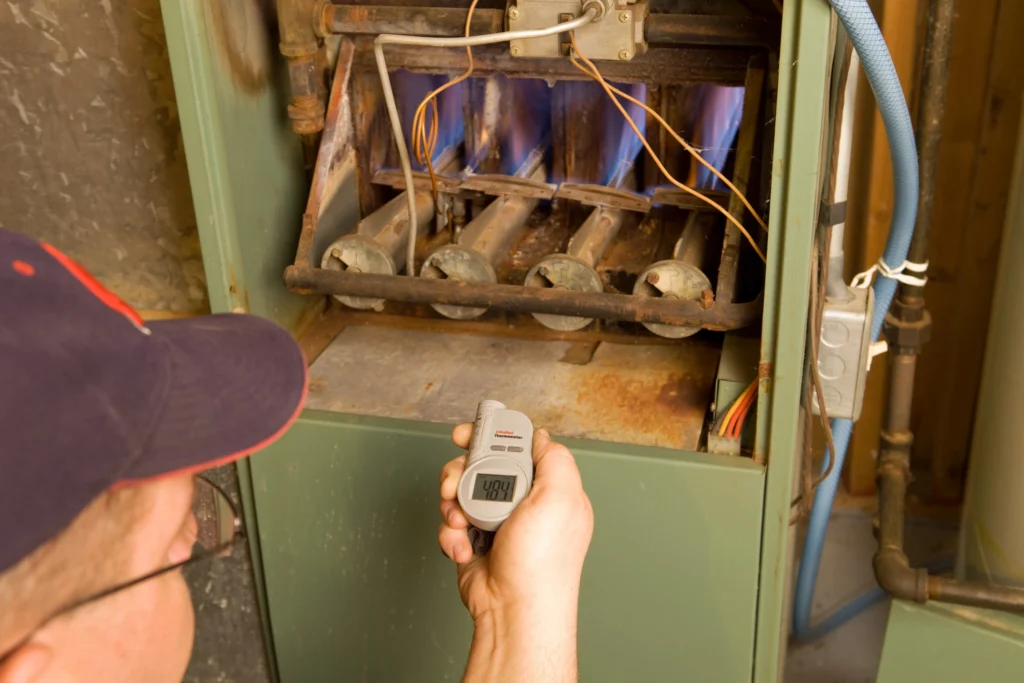When winter temperatures drop in Dayton, Ohio, and surrounding areas like Kettering, Beavercreek, and Centerville, your furnace or heat pump works overtime to keep your home warm. However, if you detect a gas smell near your furnace, it’s essential to act quickly to protect your home and family.
This article not only explains the steps to take if you smell gas but also provides insights into the differences between gas furnaces, heat pumps, and emergency heat systems for electric furnaces. Understanding these systems can help you make informed decisions about maintenance and safety.
Gas Furnaces vs. Heat Pumps: Understanding the Risks
Gas Furnaces
Risks: Unlike heat pumps, gas furnaces rely on natural gas, which introduces the potential for gas leaks. A rotten egg smell around a gas furnace indicates a potential leak, which can be hazardous.
Startup Considerations: Gas furnaces often emit minor odors during their first use of the season, typically from burning dust on components.
Heat Pumps
Safety: Heat pumps don’t use natural gas, making them safer from the risk of gas leaks. Instead, they transfer heat using refrigerant and electricity, offering a lower-risk alternative for home heating.
Efficiency: In mild winter climates, heat pumps can provide efficient heating. However, they may struggle during extreme cold, which is why many homes with heat pumps have an emergency heat option.
Electric Furnaces with Emergency Heat
How It Works: Electric furnaces or heat pumps often have an emergency heat setting, which activates electric resistance coils to provide supplemental heating during extremely cold weather.
Drawback: While safer from gas-related issues, emergency heat systems are more expensive to operate, as they rely entirely on electricity.
What to Do If You Smell Gas Near Your Furnace
Step 1: Evacuate Immediately
If you smell gas near your furnace, prioritize safety. Evacuate your home, ensuring all occupants, including pets, are outside.
Step 2: Avoid Any Ignition Sources
Do not turn on lights, use appliances, or operate your phone inside your home.
Even a small spark could ignite accumulated gas.
Step 3: Shut Off the Gas Supply
If you can safely reach your home’s main gas valve, turn it off to prevent further leakage.
Step 4: Call for Help
Contact your gas company’s emergency line or dial 911.
For inspections and repairs, call Korrect Plumbing, Heating & Air, your trusted local expert for furnace repair and maintenance in Dayton, Ohio.
Preventative Tips for Winter Heating Systems
- Schedule Seasonal Furnace Maintenance
Annual maintenance ensures your gas furnace is running efficiently and safely. Our technicians clean components, check for leaks, and test performance. - Keep Your Heat Pump in Good Condition
Heat pumps require regular filter changes and inspections to maintain efficiency. Schedule biannual maintenance to prepare for both heating and cooling seasons. - Test Your Emergency Heat
If your system includes emergency heat, test it before the winter season begins to ensure it’s functioning properly. This can prevent costly surprises during extreme cold snaps. - Install Safety Detectors
Place gas detectors near your gas furnace and smoke detectors in key areas of your home for added peace of mind.

FAQs About Gas Smells and Winter Heating
Q: Is it normal for a gas furnace to smell like gas during startup?
A: A faint odor during startup can occur, typically from minor gas emissions or burning dust. If the smell is strong or persistent, it may indicate a leak.
Q: Does a heat pump have the same risks as a gas furnace?
A: No. Heat pumps use electricity and refrigerants, so they don’t carry the risk of gas leaks. However, they still require regular maintenance for safety and efficiency.
Q: What is emergency heat on my electric furnace?
A: Emergency heat is a backup heating option that uses electric resistance coils to provide warmth during extreme cold or when your heat pump can’t keep up.
Q: What should I do if I smell gas but my furnace seems to be working?
A: Even if your furnace is operating normally, a gas smell should always be treated as a potential leak. Evacuate and contact your gas provider immediately.
Why Choose Korrect Plumbing, Heating & Air?
At Korrect Plumbing, Heating & Air, we specialize in all aspects of home heating systems, including:
Gas Furnace Repair and Maintenance: Ensuring your system operates efficiently and safely.
Heat Pump Services: From maintenance to emergency repairs, we keep your system running smoothly.
Emergency Heat Solutions: We inspect and repair electric furnaces with emergency heat to ensure reliability during the coldest days of the year.
Additional Resources:-
How to Maintain Your Heat Pump in Winter
What to Do in a Gas Leak Emergency
Signs You Need Furnace Repair
Serving Dayton, Ohio, and Beyond
We proudly serve Dayton, Kettering, Beavercreek, Centerville, Huber Heights, Miamisburg, and Springboro. If you need furnace repair, heat pump maintenance, or emergency heating services, contact Korrect Plumbing, Heating & Air today.
Stay safe and warm this winter with Korrect Plumbing, Heating & Air—your trusted local experts!
